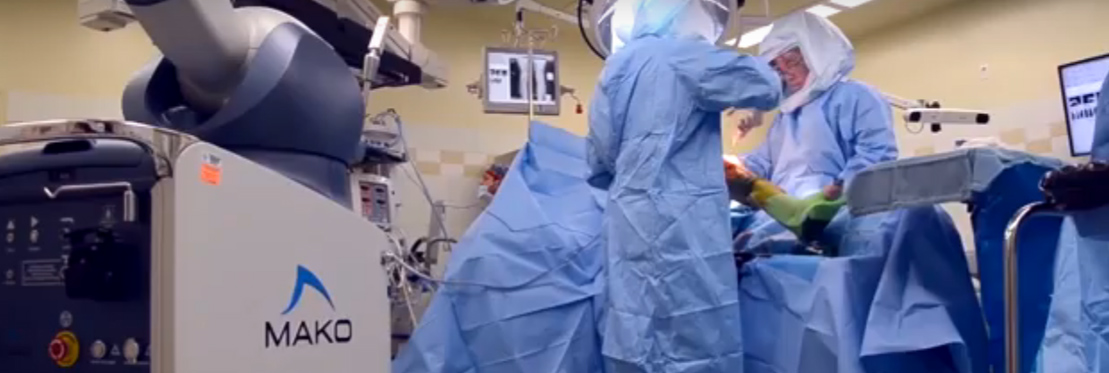MAKO SmartRobotics™ Interactive Orthopedic System
What is MAKO SmartRobotics™?
MAKO SmartRobotics™ Total or Partial Knee Replacement and Total Hip Replacement assists by guiding your doctor during surgery. Mako’s AccuStop™ technology allows your surgeon to cut less by cutting precisely what’s planned to help protect your healthy bone. Mako uses a 3D CT-based planning software so your surgeon can know more about your anatomy to create a personalized joint replacement surgical plan.
MAKO® Partial Knee Resurfacing
Partial Knee Replacement is a treatment option for adults living with early-to mid-stage osteoarthritis (OA) that has not progressed to all three compartments of the knee. MAKOplasty® Partial Knee Resurfacing is an advanced treatment option. It is powered by the RIO® Robotic Arm Interactive Orthopedic System, which allows the surgeon to perform surgery accurately through a smaller incision as compared to manual procedures. By selectively targeting the part of the knee damaged by OA, surgeons can resurface the knee while sparing the healthy bone and ligaments surrounding it.
MAKO® Partial Knee Resurfacing Benefits May Include:
- Preservation of healthy tissue and bone — only diseased portions are removed
- Optimal implant positioning Less pain A more natural feeling knee following surgery
- More rapid recovery and shorter hospital stay compared to traditional total knee Resurfacing surgery
MAKO® Total Knee
If you’re one of the millions of Americans suffering from pain caused by arthritis or an injury to the knee, and you haven’t experienced adequate relief with conservative treatment options, Mako Robotic-Arm Assisted Surgery might be right for you.
MAKO® Total Hip Replacement
MAKOplasty® Total Hip Replacement is a breakthrough solution for adults suffering from painful degenerative joint disease of the hip who need a total hip replacement. It is powered by the surgeon-controlled RIO® Robotic Arm System, which enables more accurate implant placement, which may reduce complications, such as implant wear and dislocation.
MAKO® Total Hip Replacement Benefits May Include:
- Accurate placement of your hip implant, which can reduce the likelihood of hip dislocation
- More consistency in leg length, potentially decreasing the need for a shoe lift
- Decreased risk of impingement and dislocation, this may improve the life expectancy of the hip replacement
Important Information
Total Knee Replacements
General Indications: Total knee replacement is intended for use in individuals with joint disease resulting from degenerative, rheumatoid and posttraumatic arthritis, and for moderate deformity of the knee. Knee replacement surgery is not appropriate for patients with certain types of infections, any mental or neuromuscular disorder which would create an unacceptable risk of prosthesis instability, prosthesis fixation failure or complications in postoperative care, compromised bone stock, skeletal immaturity, or severe instability of the knee. As with any surgery, knee replacement surgery has serious risks which include, but are not limited to, pain, infection, bone fracture, peripheral neuropathies (nerve damage), circulatory compromise (including deep vein thrombosis (blood clots in the legs)), genitourinary disorders (including kidney failure), gastrointestinal disorders (including paralytic ileus (loss of intestinal digestive movement)), vascular disorders (including thrombus (blood clots), blood loss, or changes in blood pressure or heart rhythm), bronchopulmonary disorders (including emboli, stroke or pneumonia), heart attack, and death. Implant related risks which may lead to a revision include dislocation, loosening, fracture, nerve damage, heterotopic bone formation (abnormal bone growth in tissue), wear of the implant, metal and/or foreign body sensitivity, soft tissue imbalance, osteolysis (localized progressive bone loss), and reaction to particle debris. Knee implants may not provide the same feel or performance characteristics experienced with a normal healthy joint.
Partial Knee Replacements
General Indications: Partial knee replacement is intended for use in individuals with joint disease resulting from degenerative, and post-traumatic arthritis, and for moderate deformity of the knee. Contraindications: Partial knee replacement surgery is not appropriate for patients with certain types of infections, any mental or neuromuscular disorder which would create an unacceptable risk of prosthesis instability, prosthesis fixation failure or complications in postoperative care, compromised bone stock, skeletal immaturity, severe instability of the knee, or excessive body weight. Common Side Effects of Knee Replacement Surgery: As with any surgery, knee replacement surgery has serious risks which include, but are not limited to, peripheral neuropathies (nerve damage), circulatory compromise (including deep vein thrombosis (blood clots in the legs)), genitourinary disorders (including kidney failure), gastrointestinal disorders (including paralytic ileus (loss of intestinal digestive movement)), vascular disorders (including thrombus (blood clots), blood loss, or changes in blood pressure or heart rhythm), bronchopulmonary disorders (including emboli, stroke or pneumonia), heart attack, and death. Implant related risks that may lead to a revision of the implant include: dislocation, loosening, fracture, nerve damage, wear of the implant, metal sensitivity, osteolysis (localized progressive bone loss), and reaction to particle debris. Partial knee implants may not provide the same feel or performance characteristics experienced with a normal healthy joint.
Hip Replacements
General Indications: Total hip replacement is indicated for joint disease resulting from degenerative and rheumatoid arthritis; and avascular necrosis. Contraindications: It is not indicated for those with infection, compromised bone stock, skeletal immaturity, mental or neuromuscular disease or excessive body weight. Common Side Effects of Hip Replacement Surgery: Like any surgery hip replacement surgery has risks which include but are not limited to: bone fracture, bone loss, change in the length of the treated leg, pain, hip stiffness, excessive bleeding, hip joint fusion, nerve damage, infection, blood clots, amputation, heart attack, pneumonia, decrease of bone mass. Implant related risks that may lead to a revision of the implant include: wear of the implant, reaction to particle debris, dislocation, fracture, loosening, audible sounds during motion and metal sensitivity.
Educational Videos
Mark Cutright, MD, Orthopedic Surgeon with HCMC Innovative Orthopedics, demonstrates how the Mako Robot is used in total knee replacement surgery so that patients know what to expect. For more information, go online at www.hcmc-tn.org or call HCMC Innovative Orthopedics at 731-644-2271.
















